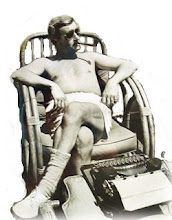"Darl's Clairvoyance"
Faulkner often does things in a non-traditional way, and he breaks a narrative rule here by having a character describe events he was not actually present for. Why does he do this? (If your answer is that Darl doesn't need to be there to know what his crazy family would be doing, you are absolutely correct. He knows them well enough to know.)
Darl, not present for Addie's death, describes how it would go down:
Dewey Dell claims it's Jewel that Addie wants to see. Addie raises herself to get a look at the coffin, then lies down and dies. Dewey Dell, drama queen, falls on her mother, keening. Anse blames Darl and Jewel for not being there with the wagon.
Faulkner alternates this scene with a cutback (in italics) to Darl and Jewel in the wagon. It's stuck in the mud.
It goes back and forth like this, and the threads of each character come out: 1) Dewey Dell begins her campaign with Peabody ("you could do so much for me if you only knew" (51); 2) Cash's obsession with the coffin--his pantomime is hilarious (48); and Anse's final words over Addie? "Now I can get them teeth" (52).
How does Darl end the chapter?



No comments:
Post a Comment